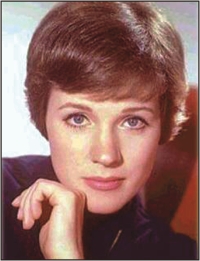Julie Andrews
The all time favourite singer actress
Who doesn't remember the singing governess of The Sound of Music, the cheerful and well loved child minder in Mary Poppins and the beautiful Gunievere in Camelot? Yes, you've got it right--we are talking of the elegant and talented Julie Andrews. This actress and singer has made waves all over the world and her charm has scarcely diminished with the years.Born Julia Elizabeth Wells in Walton-on-Thames, Surrey, England on October 1, 1935, she was discovered as a child to have a superb four-octave singing voice. Her mother and stepfather, both vaudeville performers, immediately encouraged her to take on a singing career. The immensely popular Julie performed in music halls throughout her childhood and teens, always being immensely popular. At age 20, she performed in a London Palladium production of Cinderella, launching her stage career. She came to Broadway in 1954 with The Boyfriend. In 1956 she gave a successful performance as Eliza Doolittle in the unprecedented hit My Fair Lady. Her star status continued in 1957, when she starred in the hit TV-production of Cinderella (1957) (TV) and through 1960, when she played Gunievere in Camelot. She also starred in many TV-specials. In 1963, Walt Disney approached her with an offer to star in his upcoming production, a lavish musical fantasy that combined live-action and animation. Julie said she would do it if she did not get to play Eliza in the forthcoming film production of My Fair Lady (1964). As it happened she didn't bag the prized role and opted to make an auspicious film debut in Disney's Mary Poppins (1964), a huge hit which got her the Academy Award for Best Actress. (Incidentally, Audrey Hepburn, who played Eliza in the film My Fair Lady, wasn't even nominated.) Then followed The Sound of Music (1965), the highest-grossing movie of its day and one of the highest-grossing of all time. However, there was a hitch in her career: the audiences identified her only with singing, sugary-sweet nannies and governesses. They could not accept her in dramatic roles such as in The Americanisation of Emily (1964), or the Hitchcock thriller Torn Curtain (1966)). However, the musicals Julie subsequently made did not fare well at the box offices--be it Thoroughly Modern Millie (1967), Star! (1968), or Darling Lili (1970) all bombed at the box office. Fortunately, Julie did not let this keep her down. She took up work in nightclubs and hosted a TV variety series in the 1970s. Later she returned to filmdom with an appearance in 10 (1979), directed by husband Blake Edwards. He helped her climb steadily up the career graph with films such as S.O.B. (1981) and the woman playing a man playing a woman in Victor/Victoria (1982). Other films of this period were The Tamarind Seed (1974), The Man who Loved Women (1983), Duet and That's Life (both in 1986). She continued on her acting career through the 1980s and 1990s in movies and TV, hosting several specials and starring in a short-lived sitcom. In 1995, she made a successful return to Broadway to star in the musical version of Victor/Victoria. Unfortunately, an operation on her vocal chords left her singing voice badly damaged in 1998. The courageous Julie continued with her career: giving a show-stopping appearance at the 1999 Tony Awards and appearing in the TV-movie One Special Night (1999). Julie Andrews, in all her versatility, will no doubt keep us very entertained for years to come. Compiled by Cultural Correspondent
|

|